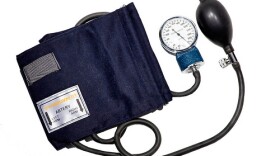Maintaining a healthy blood pressure is essential to reducing your risk of heart disease (regarded as the number one killer in the world), along with kidney disease, type 2 diabetes, and dementia.
The newest guidelines on blood pressure from the American Heart Association and the American College of Cardiology contain familiar lifestyle recommendations, but also a major change for consumers of alcohol.
KERA’s Sam Baker talks about this and other recommendations with Dr. Brandie Williams, a cardiologist with Texas Health Stephenville and Texas Health Physicians Group.
Dr. Williams: Instead of blood pressures greater than 140 over 90, now we're looking at 130 over 80.
For those patients who don't have heart disease or other risk factors for heart disease, those blood pressures can be monitored a little longer, and we can really initiate lifestyle changes for three to six months and look at those blood pressures again.
Baker: Wasn't there an emphasis on trying to get to 130 before?
So the 130 over 80 before were really on those patients who already had clinical heart disease, had a history of a stroke, diabetes, or kidney disease, and those recommendations still really stay in.
But now what? We're recommending it for a broader group?
A little bit broader of a group.
For those patients who are older, those patients who have a lower cardiovascular risk score, we're still going to keep a closer eye on them.
And anyone greater than 130 over 80, we are going to initiate lifestyle changes for three to six months and check those blood pressures again.
Lifestyle changes such as...
- The DASH diet,
- Reducing the sodium intake and increasing dietary potassium.
- Moderate physical activity program
- Trying to manage stress.
Those are all things that help bring down the blood pressure.
There was an emphasis on lower sodium intake and even recommending the use of potassium-rich substitutes.
We've seen that the increase in salt in the American diet has led to higher blood pressure. We want to decrease that salt intake, trying to eat more things like fruits and vegetables, whole grains, fish, and poultry. A lot of those things will include the daily potassium you need, period.
But you don't want to increase the potassium unless you talk to your doctor, because if you have kidney disease or things like that, you don't want to increase that without asking first.
The guidelines used to say two drinks for men, one for women. Now it's no alcohol?
They found that alcohol contributes a lot to high blood pressure. We're even finding that alcohol contributes to dementia. So, instead of the recommendations in the past that you could have some moderation of alcohol, it's now recommended that you abstain from alcohol completely.
At one time, weren't we saying alcohol could be good for digestion, and that it had other benefits?
Now, it may be beneficial for other medical specialties or organs, but talking about high blood pressure, we found that taking in alcohol increases the blood pressure too much, and it makes it hard to manage the blood pressure.
So, if you want to maintain a good blood pressure, what should you remember to do?
Stay active, eat a diet rich in fruits and vegetables, whole grains, fish, and poultry. Try to stay on a low-sugar, low-fat diet. We also want to emphasize that patients who are pregnant, or who plan on becoming pregnant, should keep a close eye on their blood pressure and have follow-ups with their doctors as well.
RESOURCES:





